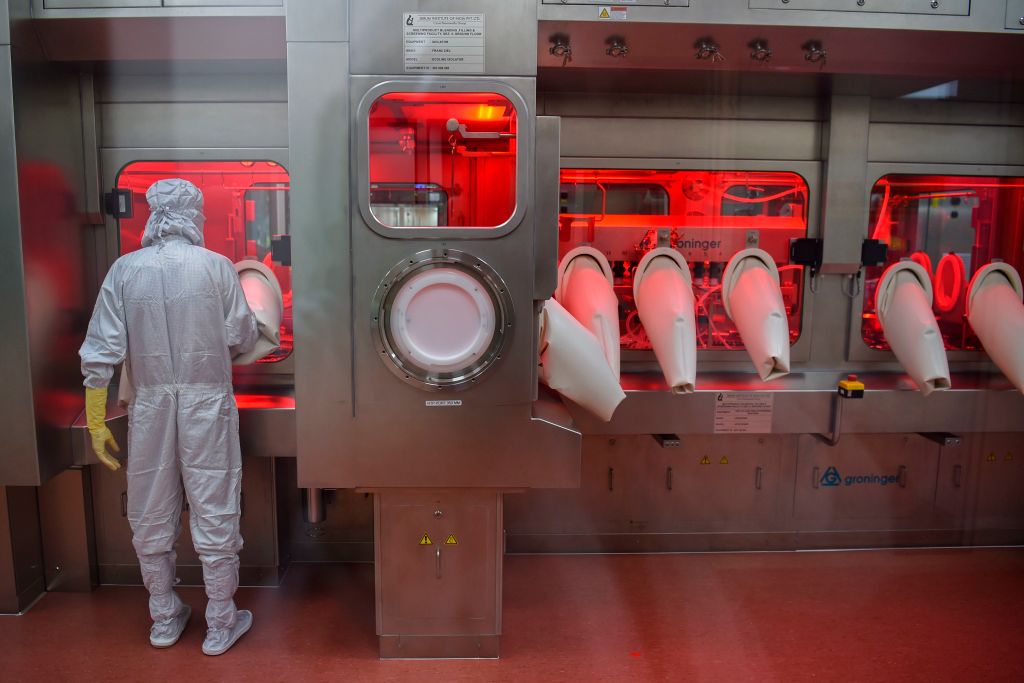The UK vaccination programme has been such a success to date that until yesterday evening it seemed a formality that the government would achieve its target of offering all adults at least a first dose of a Covid vaccine by July. Indeed, on Monday it looked as if this date might be brought forwards when it was announced that there would be a huge uplift in vaccine shots available, thanks to the arrival of a large consignment of AstraZeneca vaccine from India. Instead of 2 million doses a week, the vaccination programme would be able to deliver 4 million doses.
On Wednesday evening, however, that hope was shattered. Firstly, Ursula von der Leyen renewed her threat to block exports of the Pfizer vaccine, British supplies of which are sourced from a factory near Brussels. Then, a letter from NHS England revealed that there would be a ‘significant reduction’ in vaccine doses available from the week beginning 29 March. At Wednesday evening’s press briefing, Matt Hancock hinted that production problems were to blame, saying ‘vaccine supply is always lumpy’. This morning, a slightly different version emerges. According to Adar Poonawalla, CEO of the Serum Institute of India, the company which manufactures the AstraZeneca vaccine, the Indian government is holding back exports in an effort to speed up the vaccination programme there. It is doing, in other words, exactly what the EU is threatening to do.
The UK vaccine rollout programme was always going to face a challenge at the end of March. Since early January, the government has followed a policy of delaying planned second vaccination shots for 12 weeks. Those 12 weeks are now up, and everyone who received a first shot in January and February must now be scheduled for a second jab. In order to keep the administration of first shots rolling forwards, in other words, it is necessary to roughly double vaccine supplies. In the case of AstraZeneca, the government seems to have attempted to achieve this by looking to India, which was licensed to produce the vaccine – so we were led to believe – chiefly for distribution to the developing world. According to Poonawalla, 5 million Indian-made shots arrived in Britain in early March.
Having bragged that the Oxford/AstraZeneca vaccine would be the ‘vaccine for the world’, it does now not look good for the government that it is relying on Indian-made vaccines. Couldn’t UK-production – which currently takes place at factories in Oxford, Wrexham and Staffordshire – have been stepped up, or is our industrial base too degraded?
As for the Pfizer vaccine, that has so far accounted for around a quarter of the 38 million shots so far delivered. If the EU goes on to block further supplies of the vaccine being exported to Britain – and the EU may feel bolstered by the Indian government’s actions – it will knock a further hole in the UK government’s ambitions.
Ministers have been widely-praised for their foresight in ordering large quantities of vaccines before their effectiveness had been proven. Matt Hancock has also praised his own wisdom in dropping a possible tie-up between Oxford University and Merck, on the grounds that Merck could not guarantee supplies in the event of the US moving to block exports. The government chose to go with AstraZeneca instead so that vaccine supplies could be home-grown. But it now seems that the government failed to prepare for vaccine nationalism on the part of the EU and India. At least, however, it seems that the task of vaccinating (with one dose) the over-50s, healthcare workers and vulnerable younger people will be largely complete by the end of March. Those groups between them have accounted for 99 per cent of Covid deaths so far.







Comments